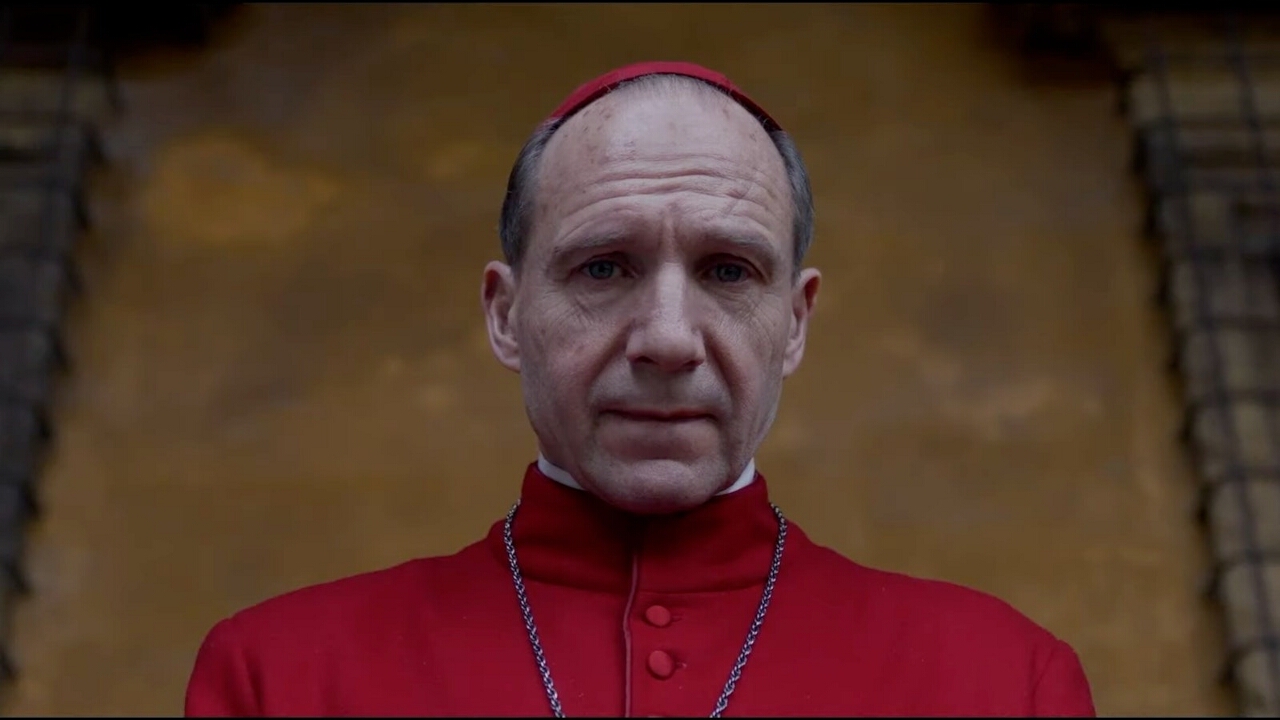Conclave
Rating
![]()
Director
Edward Berger
Screenplay
Peter Straughan (Book: Robert Harris)
Length
2h 00m
Starring
Ralph Fiennes, Jacek Koman, Lucian Msmati, Stanley Tucci, John Lithgow, Thomas Loibl, Brian F. O’Byrne, Isabella Rossellini, Rony Kramer
MPAA Rating
PG
Original Preview
Review
Of the myriad governmental and quasi-governmental assemblages, it is challenging to make those events seem exciting. Conclave aims to dispel the notion that official functions are as dry as dirt.
The source of this particular story is a novel by Robert Harris. It tells of the death of a pope and the papal conclave convened to elect his successor. Ralph Fiennes takes the lead as the Dean of Cardinals who will oversee the functional responsibilities of the conclave, including ensuring sequestration. Things don’t quite add up from the moment he arrives to find the pope dead and the last person to have seen him (John Lithgow) was said to have been asked to resign, which he refused to do claiming he had nothing wrong. What follows is the unraveling of a web of lies and misdeeds, exposing the rampant ambitions of men who lust for power.
Fiennes delivers a refined, cultured performance as a cardinal whose desires are for his own parish not for the drudgery of his official duties as the dean. However, he knows his responsibility and forges ahead, exposing corruption when necessary but otherwise remaining as faithful a steward to God and to process as is possible. Lithgow oozes egomania without twirling his moustache. Although he’s cast in a light that makes him a villain, there’s nothing quite so villainous about his performance and that anchors what could have been a throwaway, predictable antagonist.
Less refined are Sergio Castellitto as a boisterous windbag whose regressive views of society are masked by a conceptual desire to return the church to its Latin roots. Although his sins are far less sinister than those of some of his compatriots, he fits the role of villain more suitably. That may be intended but it robs the character of its salience as an emblem for a stagnant institution seeking punishment and condemnation rather than grace and charity. Coming in at the other end of the spectrum is the nonentity of Carlos Diehz. Despite the solid delivery of his 11th-hour admonition of his fellow cardinals, Diehz blends inoffensively into the background. This may be the intention but his inability to command the screen creates doubts in his position within the picture itself.
Finally, we have three actors who deliver solid performances that we expect but without always ring true. Stanley Tucci starts off strong as the self-effacing cardinal with a desire for the papal throne but who hides his interest in couched language suggesting he will serve only if so chosen and not out of any desire of his own. As the film progresses, this stance becomes less subtle and more obvious as he pushes towards his own ascendance. Tucci is relatively well known but Lucian Msamti is not but this might well be a launching pad for future roles given the strength of his performance. His cardinal is headstrong and charming, a performance that helps set up a mid-film reveal that commands attention. It’s that rare moment of vulnerability and contrition that feels natural and unforced. It is probably the second best performance in the film. Third, and just ahead of Tucci in terms of quality, is Isabella Rossellini, a titan of the medium whose unassuming performances have often left her underrecognized. This is another simple performance that hinges on her piety and forcefulness as well as the counter film’s patriarchal obsession. She will not be cowed and stands her ground until dismissed but whose observational abilities bring clarity to a narrative that needs a catalyst for its final course.
Following a successful TV career, director Edward Berger launched to fame with his re-adaptation of Erich Maria Remarque’s celebrated antiwar novel All Quiet on the Western Front. The original 1929 film is one of history’s greatest and it was concerning that he would tackle something so cherished. The end result seems to have worked as it ended up nominated for Best Picture and Berger almost secured a Best Directing nomination. This time, he’s likely to make the final five with a film that demands your awareness in spite of its seeming solemnity. With his deft handling of Peter Straughan’s faithful screenplay adaptation, Berger makes a riveting picture that telegraphs some of its twists but not all of them. It’s perhaps the final one that stretches credulity but that’s the same way the book ended so there’s no question it was intended to be there.
It’s in that final moment that the audience is asked to reflect on the quality and humanity of the cardinals who head the Roman Catholic Church. They may stand above the masses with a sense of importance but they are fallible humans underneath the cassocks. They have the same foibles, imperfections, and strengths that the rest of us do but seldom are given an opportunity to display that aspect of their personalities. Conclave explores that with fine detail. It asks the viewer to contemplate the fallibility of man, the dangers of a lust for power, and simple acts of defiance in the face of damning odds. It also wants the viewer to question the patriarchal mandate of the Church and its mistreatment of women. It explores the idea that there is much hypocrisy within the Catholic Church and there is a need to embrace the notions of acceptance, mercy, and compassion or risk becoming an esoteric and forgotten institution.
Oscar Prospects
Guarantees: Picture, Actor (Ralph Fiennes), Adapted Screenplay
Probables: Directing, Original Score, Film Editing, Cinematography, Production Design
Potentials: Supporting Actor (Stanley Tucci), Costume Design
Review Written
December 18, 2024



















Leave a Reply
You must be logged in to post a comment.